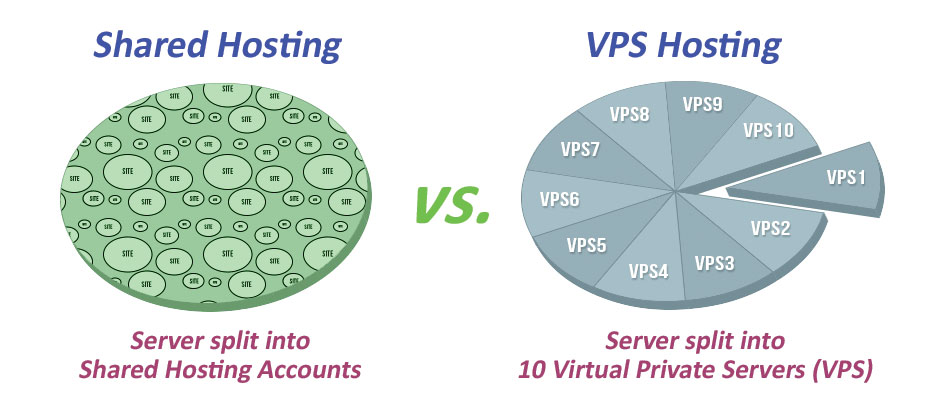In many ways, web hosting can be very comparable to mobile phone data plans. Shared hosting is like having a shared data plan for the whole family. Responsibility is shared among its users, and if one person uses up all the allotted resources, it’s used for all the users. VPS Hosting is more like an individual data plan. You’ll pay more to customise it to your specific needs, get more resources, and control over changing your setup as you see fit.
With shared hosting, you’re sharing the same server with many other users whereas, with VPS Hosting, you have your own piece of the server that you can use however you like. Choosing the right hosting service depends on what your specific resource needs, performance demands, security requirements, cost constraints and server administration preferences.
When it comes to shared hosting in Australia, your server resources have some limitations. Your website will access usage to an available amount of CPU’s, memory/RAM, and disk space. It will not be able to exceed the maximum amount of resources allowed. This is a good option if your website doesn’t require a lot of space or processing requirements. However, with any shared plan, other websites could affect your website’s performance. It’s the risk of choosing a more economical shared hosting plan.
VPS Hosting in Australia is a little different in the way it works. With VPS hosting, you’ll have access to a greater amount of disk space and higher resource availability. This is important if your website needs to go beyond the basic level of shared hosting. Due to the higher performance of VPS Hosting, it’s a much better option to manage high traffic demands and multiple websites.


Security is another important factor to look at when choosing between Shared and VPS Hosting. With shared hosting for your Australia website presenting huge benefits in cost, it can be riskier on the security end of things. Each hosting provider can differ in how much they’ve invested in ensuring dedicated protection for its shared hosting customers. Shared hosting is still considered very safe, but security breaches can occur because a common server cannot guarantee 100% security. If one shared hosting customer makes a mistake or experiences a technical difficulty, it’s likely to affect other sites because you are sharing the same space on the same machine.
With VPS hosting, you can ensure your website’s security with safety features only available through that option. You can implement better customer support services that will assist patrons when they need it. If your business needs to protect personal data, it’s worth considering the upgrade to a VPS.
Server administration and management usually vary between the two. In shared hosting, the shared hosts have the responsibility of handling the hardware for the user. In VPN, you have the responsibility of managing the hardware. You need to hire a host to monitor the aspects that are naturally controlled by a shared hosting service. There is no technical maintenance needed to be done by the user when he is on shared hosting. You get all the basic management functions without adding to the cost or spending extra time. With Host Geek, we can cover this for our clients with our Advanced cPanel Security Service, which is a once-off cost.
The final major point between both services is the scalability factor. In shared hosting, storage abilities must not get maxed out and the server space must not exceed the user demand. This is because in case that happens you will start getting internal errors from the host. VPN, on the other hand, can handle any amount of traffic. You need to consider the scale of your website before coming to a decision as the scalability comes with the condition of higher costs and maintenance needs, however, it means you get more flexibility which is beneficial for any growing business.

